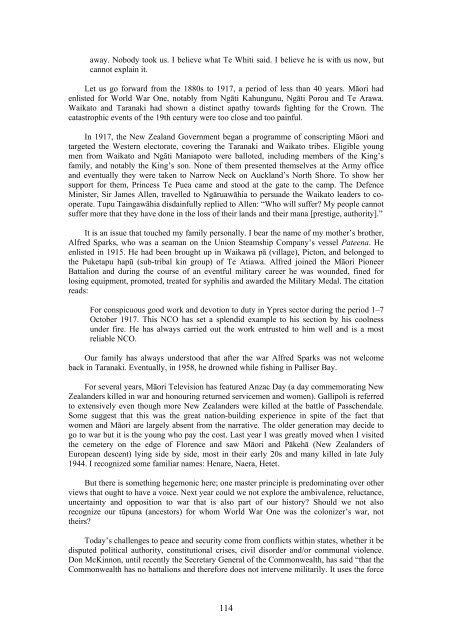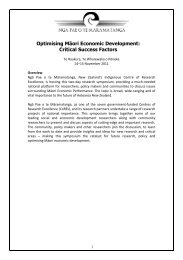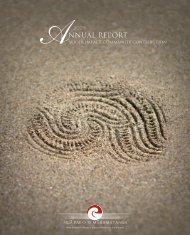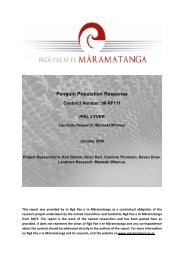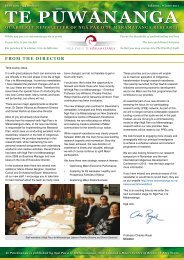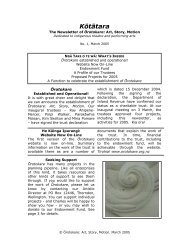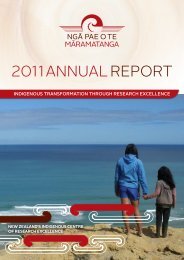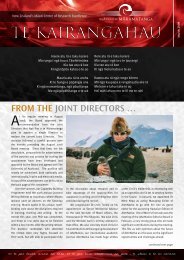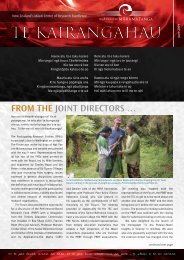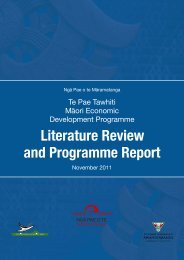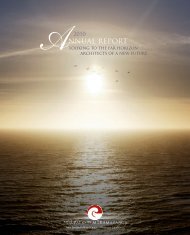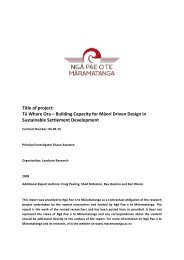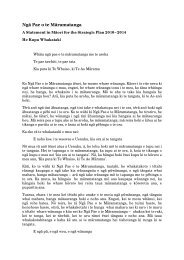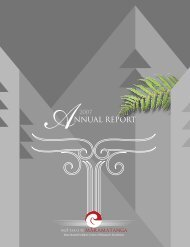traditional knowledge conference 2008 te tatau pounamu
traditional knowledge conference 2008 te tatau pounamu
traditional knowledge conference 2008 te tatau pounamu
Create successful ePaper yourself
Turn your PDF publications into a flip-book with our unique Google optimized e-Paper software.
away. Nobody took us. I believe what Te Whiti said. I believe he is with us now, butcannot explain it.Let us go forward from the 1880s to 1917, a period of less than 40 years. Māori hadenlis<strong>te</strong>d for World War One, notably from Ngāti Kahungunu, Ngāti Porou and Te Arawa.Waikato and Taranaki had shown a distinct apathy towards fighting for the Crown. Thecatastrophic events of the 19th century were too close and too painful.In 1917, the New Zealand Government began a programme of conscripting Māori andtarge<strong>te</strong>d the Wes<strong>te</strong>rn electora<strong>te</strong>, covering the Taranaki and Waikato tribes. Eligible youngmen from Waikato and Ngāti Maniapoto were ballo<strong>te</strong>d, including members of the King’sfamily, and notably the King’s son. None of them presen<strong>te</strong>d themselves at the Army officeand eventually they were taken to Narrow Neck on Auckland’s North Shore. To show hersupport for them, Princess Te Puea came and stood at the ga<strong>te</strong> to the camp. The DefenceMinis<strong>te</strong>r, Sir James Allen, travelled to Ngāruawāhia to persuade the Waikato leaders to coopera<strong>te</strong>.Tupu Taingawāhia disdainfully replied to Allen: “Who will suffer? My people cannotsuffer more that they have done in the loss of their lands and their mana [prestige, authority].”It is an issue that touched my family personally. I bear the name of my mother’s brother,Alfred Sparks, who was a seaman on the Union S<strong>te</strong>amship Company’s vessel Pa<strong>te</strong>ena. Heenlis<strong>te</strong>d in 1915. He had been brought up in Waikawa pā (village), Picton, and belonged tothe Puketapu hapū (sub-tribal kin group) of Te Atiawa. Alfred joined the Māori PioneerBattalion and during the course of an eventful military career he was wounded, fined forlosing equipment, promo<strong>te</strong>d, trea<strong>te</strong>d for syphilis and awarded the Military Medal. The citationreads:For conspicuous good work and devotion to duty in Ypres sector during the period 1–7October 1917. This NCO has set a splendid example to his section by his coolnessunder fire. He has always carried out the work entrus<strong>te</strong>d to him well and is a mostreliable NCO.Our family has always understood that af<strong>te</strong>r the war Alfred Sparks was not welcomeback in Taranaki. Eventually, in 1958, he drowned while fishing in Palliser Bay.For several years, Māori Television has featured Anzac Day (a day commemorating NewZealanders killed in war and honouring returned servicemen and women). Gallipoli is referredto ex<strong>te</strong>nsively even though more New Zealanders were killed at the battle of Passchendale.Some suggest that this was the great nation-building experience in spi<strong>te</strong> of the fact thatwomen and Māori are largely absent from the narrative. The older generation may decide togo to war but it is the young who pay the cost. Last year I was greatly moved when I visi<strong>te</strong>dthe ceme<strong>te</strong>ry on the edge of Florence and saw Māori and Pākehā (New Zealanders ofEuropean descent) lying side by side, most in their early 20s and many killed in la<strong>te</strong> July1944. I recognized some familiar names: Henare, Naera, He<strong>te</strong>t.But there is something hegemonic here; one mas<strong>te</strong>r principle is predominating over otherviews that ought to have a voice. Next year could we not explore the ambivalence, reluctance,uncertainty and opposition to war that is also part of our history? Should we not alsorecognize our tūpuna (ancestors) for whom World War One was the colonizer’s war, nottheirs?Today’s challenges to peace and security come from conflicts within sta<strong>te</strong>s, whether it bedispu<strong>te</strong>d political authority, constitutional crises, civil disorder and/or communal violence.Don McKinnon, until recently the Secretary General of the Commonwealth, has said “that theCommonwealth has no battalions and therefore does not in<strong>te</strong>rvene militarily. It uses the force114


